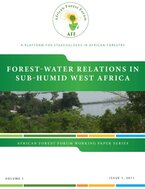With 28 shared river basins covering 71% of the region, sub-humid West Africa would appear to have considerable water resources. This also makes the countries in the region very much water interdependent. However, evidence abounds that for the last one century many parts of the region have faced severe water stress. This has been traced in part to the varying climate in the sub-region. Most of the southern part of the region enjoys relatively adequate and bi-modal rainfall between March and October, while the drier northern part has a uni-modal regime of rainfall lasting barely four months in a year. In addition to climatic variations, the situation is complicated further due to the fact that the region’s major watercourses have their sources in high rainfall areas and flow through the Sahelian zone. Several interventions have been made to harness and optimize the benefits from this resource, including the construction of large dams as water receptacles and for the regulation of flows. Even with these efforts the water stress in many parts of the sub-region remains a big problem. As part of its contribution to managing the African forests sustainably, as well as generating and sharing knowledge and information for sustainable forest management, the African Forest Forum commissioned a study on the broad area of forestwater relations, covering eight sub-humid West African countries of Benin, Ghana, Guinea Conakry, Ivory Coast, Liberia, Nigeria, Sierra Leone and Togo. The issues addressed in this study include: the extent of shared commitment and desire to promote synergy and strengthen cooperation of the member states on water, water issues in the sub-region, water supply in the region as related to forest ecosystems, learning and sharing of experiences and best practices, potential for collaboration in managing and using water resources and related forest ecosystems in the sub-region. This was essentially a desk study primarily aimed at identifying the major water resources in the sub-region, how they are linked to various forest ecosystems that serve as water catchment forests, and challenges and opportunities in managing these forests to improve supply of quality water to the sub-region. The report therefore addresses issues relating to forest and water supply, and more specifically the key water sheds and river basins as they relate to supporting forest ecosystems, issues in management of forests in water catchment areas including aspects related to policies, regulations, challenges and opportunities. The report identifies stakeholders in water resources and recommends ways for harmonising their interests with respect to water supply, use, trade and management. It also proposes improvements in knowledge and information sharing. Also some ideas are given on the way forward with water resources, including sub-region-wide coordinated policy and legislative actions and incentives that will enhance forest management for sustainable water supply and protection of water catchment areas. It proffers the use of adaptive technologies to enhance water yield and use in the sub-region. This report has been made possible through collaborative efforts of the African Forest Forum and the Centre for Sustainable Development at the University of Ibadan in Nigeria under the guidance of its Director, Prof. Labode Popoola, who was responsible for writing this report and to whom credit should be attributed to for this work. Prof. Godwin Kowero Executive Secretary, African Forest Forum

